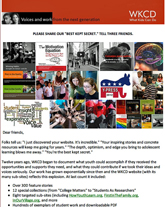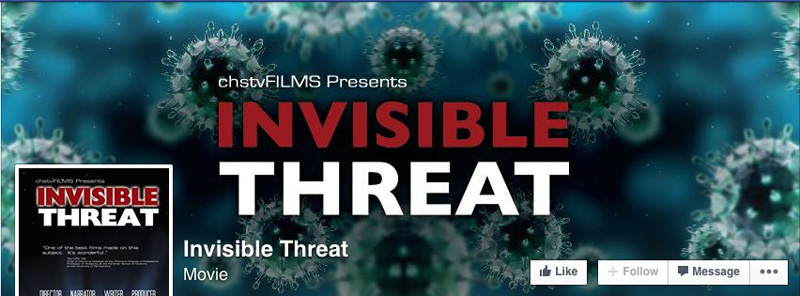SUBSCRIBE TO OUR____ NEWS BLAST
OTHER WKCD WEBSITES SPECIAL COLLECTIONS Students as Allies in School POPULAR WKCD PUBLICATIONS (PDFS] A Guide to Creating Teen- Cultural Conversations through Creative Writing Documenting Immigration Stories First Ask, Then Listen: How Your Students Can Help You Teach Them Better Making Writing Essential to Profiles of Politically Active Youth Queer Youth Advice for Educators The Schools We Need: Creating Small High Schools That Work for Us
| California High School Students Document Why Vaccinations Matter by WKCD| FEBRUARY 12, 2015
CARLSBAD, CA—Two years ago, when a group of high school students in Carlsbad, California began work on a documentary film about childhood immunization, they never thought they would find themselves in the eye of a storm. The story of their award-winning “Invisible Threat” offers a cautionary tale about why vaccinations matter and how controversy can trump science. Measles is back, the latest headlines blare. Last year, about 650 cases were reported in the United States, the largest outbreak in 20 years. This January, more than a hundred cases were registered across 14 states, many linked to Disneyland in California. No one disputes the cause: a slide in the country’s historically high vaccination rates. In the 15 years since measles was officially eradicated, states (47 now) have offered “personal belief” exemptions that allow parents to opt out of mandatory vaccinations. Alleged links between childhood immunization and autism have fueled the opt-out movement. For the young filmmakers at Carlsbad High, today’s alarming measles outbreak and the controversy that surrounds what should be done are subjects they know well. The film's roots The idea for “Invisible Thread” actually came from a group of Rotary Club volunteers who had been working for 20 years to promote immunization in San Diego County through a local “Don’t Wait…Vaccinate” campaign. Their worries matched those of health advocates alarmed at the resurgence of diseases like measles and whooping cough, once contained by immunization programs. When the Rotary Club approached students at the Carlsbad High School's awarde-winning television and film department (CHSTVfilm), they were already fans of the documentaries students there had produced on hunger and the Holocaust. They figured the students might be able to do a good job sounding the drum for vaccinations, too.
The Rotarians proposed a 20-minute educational film explaining how the immune system and immunization work—an approach the students declared boring. The students told the Rotary that if they were going to produce the film, they had to do it on their own terms, including exploring the subject from both sides. In time, the club agreed and started raising funds to cover the production. The students dived in. They did as much Internet research as they could. They interviewed medical experts who prized vaccines and parents who distrusted them, along with a local osteopath who treated autistic children. Some of the students initially believed vaccines and autism were linked, but changed their minds as they dug deeper into the scientific research, which showed no conclusive link. Public outcry What the students and their adult advisor hadn’t counted on, was the public outcry that exploded when word spread about their project and its focus on immunization. The movie, still in progress, was sure to be “pro-vaccine propaganda,” the local newspaper and a popular blogger charged. Threatening phone callsand Internet comments directed at CHSTV derailed the project for several months. "It was all social controversy. There was no science controversy," one of the film’s young producers told a reporter from the Los Angeles Times. The final version of "Invisible Threat," completed in spring 2013 but shown only to select audiences, did end up taking a strong pro-vaccine position. Critics, who said they hadn't been allowed to see the movie, leaped back into action about a year later, when the film was set to screen on Capitol Hill. Largely aligned with vaccines-cause-autism activists, they argued that the movie was "scripted with industry talking points" and the work of adults operating under false pretenses, not students. In fact, 16 students had a hand in shooting, writing, editing and appearing in "Invisible Threat”—and the final result drew praise from public health experts nationwide. Winning recognition "It’s one of the best films on this subject, it’s wonderful,” said Dr. Paul Offit, chief of the Division of Infectious Diseases at Philadelphia’s Children’s Hospital. "They did a good job with the scientific material," said Dr. Melinda Wharton, director of the U.S. Centers for Disease Control and Prevention's immunization services division. Ironically, months after the film had been completed, public protest in Carlsbad continued to dissuade the high school from screening "Invisible Threat" locally, and most of the students and parents at the school had yet to see it. Meanwhile, public screenings elsewhere in the nation had given rise to an “Invisible Threat” movement. Finally in August 2014, in honor of National Immunization Awareness Month, the film became available on demand for public rental—and its young producers, at last, could take a local bow. What Kids Can Do, Inc. | info@whatkidscando.org | www.whatkidscando.org
|



